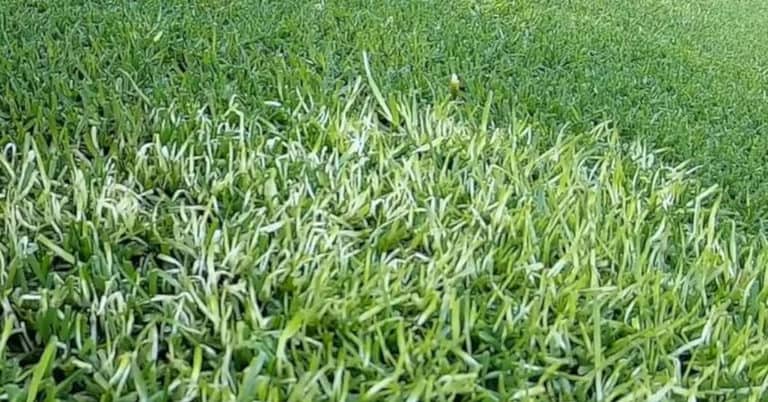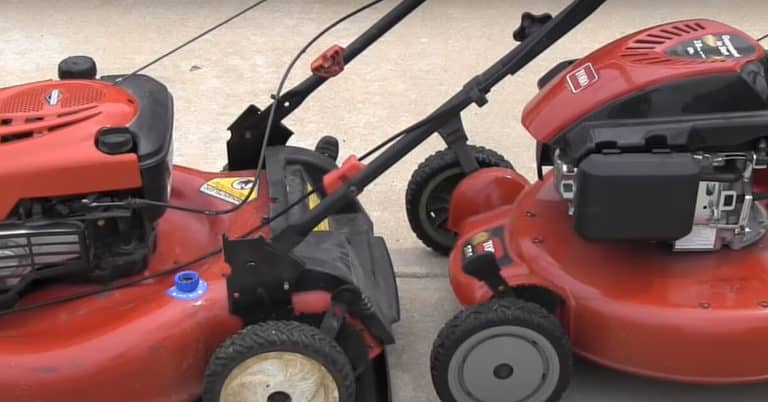Why Is My Lawn Full Of Flies
Flies are one of the most common pests you can find in your garden as you carry out your regular lawn care. Why are there so many flies in my yard can be a common question asked? There’s something that draws flies all over yard, so knowing what it is and how to fix it can be a blessing.
You can find several reasons fly populations are increasing, such as your grass being too tall, food scraps around the lawn, pet feces being present, or garbage not being sealed properly. Along with this are other causes such as standing water, compost piles, and more.
Luckily, it isn’t too challenging to get rid of flies. So, in our guide, you can learn more about why does my yard have so many flies. By the end, you’ll be armed with enough information on how to get rid of grass flies from around your lawn. (Learn the Difference Between Topsoil And Lawn Soil)
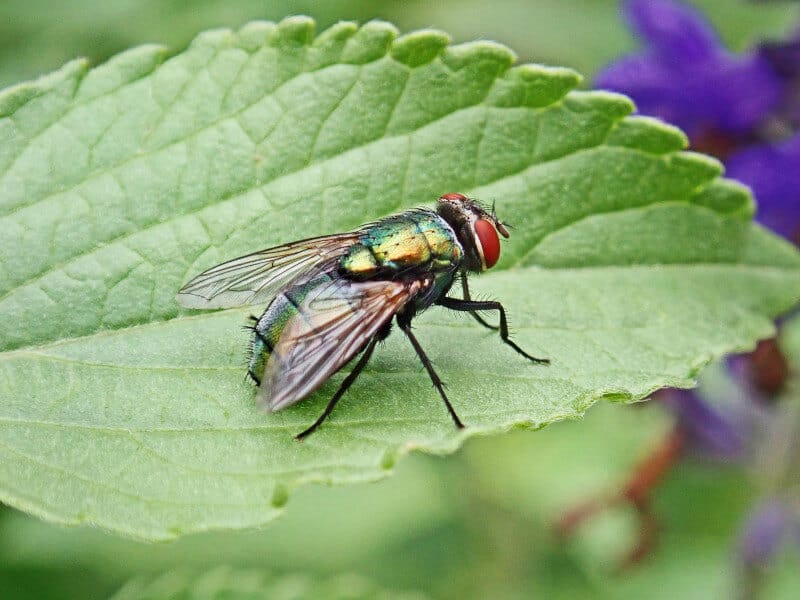
The Common House Fly
In any fly population, you’ll find thousands of different species. But, around the home and yard, it is the Musca domestic, the one that bothers us all the most.
Although any average female fly lifespan is a month, she can lay 500 eggs on average. On your patio, even a handful of female flies can quickly multiply into thousands of flies.
Typically, a female housefly lays over 100 eggs after mating and hatch quickly. Since flies feed on many things, such as feces or garbage, they can transmit diseases easily.
Maggots can spawn in less than eight hours when the weather is warm enough. Fortunately, you may get rid of the flies on your property without using chemicals that might endanger your family, pets, or other people.
The first step for successful control of your fly problem is determining where flies are breeding. The second is understanding whether you are dealing with house flies, blowflies, cluster flies, or other large flies.
Why Do I Have Thousands Of Flies In My Yard?
Flies that won’t leave your grass are often attracted for a few common reasons. The simplest explanation for why you have flies and other insects around your lawn is something is attracting them.
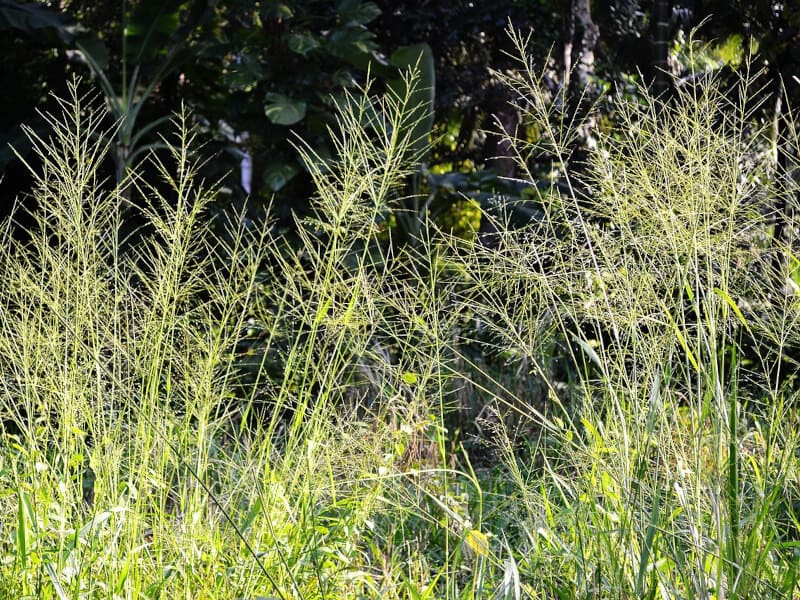
1. Tall Grass And Debris
If you maintain tall grass, it offers ideal breeding grounds; thus, flies are likely to be on your lawn.
2. Cookouts and BBQs Attract A Few Flies
Flies will be attracted to your lawn during or after a cookout because of the smell of the food that’s been made or spilled.
3. Unsecured Garbage
Lawn Flies are drawn to garbage, especially if it is left out for an extended period.
4. Manure and Compost
Any type of manure is likely to draw flies. This can be from local compost bins or pet waste.
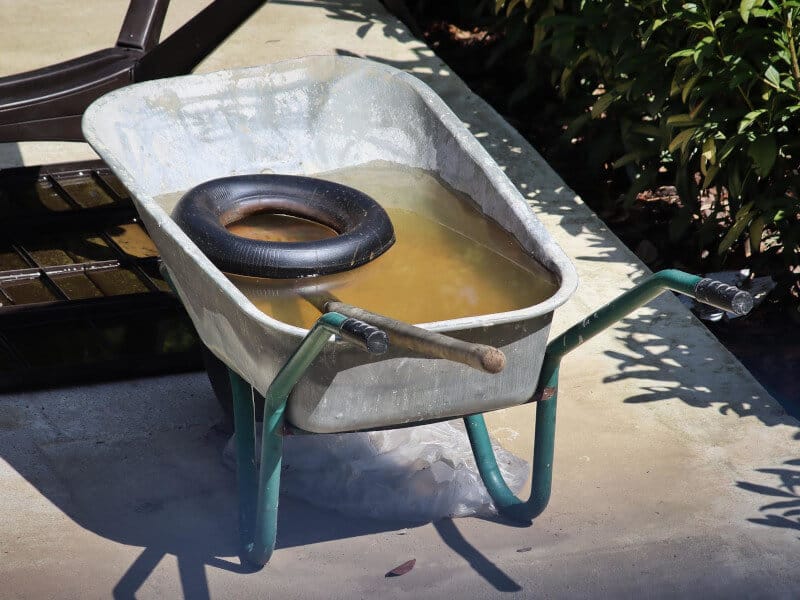
5. Stagnant Water
Water in birdbaths or containers filled with rainwater can be full of stagnant water, and these areas attract flies and other insects, such as mosquitos.
How To Remove Flies From Grass
The best way to get rid of the flies on your lawn may depend on what flies they are. Flies include mosquitoes, gnats, crane flies, fruit flies, and midges.
Although their larvae feed on bases and individual stems, crane flies resemble mosquitoes that don’t bite, which results in poor development and dry patches.
When disturbed, swarms of midges and gnats are hiding in the lawn form. You can use the following techniques to remove flies from grass:
1. Use Bacteria to Get Rid Of Flies
Bacillus thuringiensis israelensis is a naturally occurring soil bacterium you may buy at a garden store. It’s a disk for water that kills mosquito larvae in ponds and rain barrels. One disk is recommended for 100-foot-deep ponds and one-fourth for rain barrels. Mix 1 to 2 tablespoons of Bti concentrate per gallon of water to saturate the lawn and kill flies.
2. Use Nematodes
A microscopic nematode releases lethal bacterium, which kill gnat larvae and helps get rid of flies from your lawn. Garden centers sell it, and then mix one teaspoon of nematode water into a gallon of water and sprinkle it on your lawn. Keep your lawn moist for seven days to keep nematodes alive as they go about killing flies in their larval forms.
3. Pesticides
Apply a residual pesticide where flies land and rest. This kills flies. If flies aren’t as present, they’re probably breeding elsewhere; pesticide dusting and prevention will work.
4. Use Insecticides
Flies on your lawn may show a breeding ground. Use pesticides to kill the maggot swarm to prevent further larval development.
Pyrethrin affects insects.
- Examine the area with the most flies; you’ll find the breeding ground where flies lay eggs and maggots may be present.
- Spray pesticide, clean, and reapply. Use these sprays only if other methods fail, as they may kill beneficial insects.
Preventive Methods to Prevent Flies
1. Get Rid of Trash and Food
Most flies live for two to four weeks. After that, flies will die out or leave by removing trash, pet feces, garbage can lids, and scents.
2. Trim Lawn Regularly
Don’t leave mounds of cut grass lying around; trim your lawn more often as flies love overgrown grass and bushes.
3. Drain Stagnant Water
Standing water attracts flies and mosquitoes. Remove debris and water pits, and keep birdbaths full of fresh water.
4. Care For Your Compost Bin
Decaying debris attracts flies to compost bins. So keep your compost bin far from home. Also, ensure it’s not too warm or moist to assist larval growth.
5. Add Carnivorous Plants and Fly-Repelling Plants
Planting carnivorous plants like Venus flytraps and pitcher plants can reduce lawn populations. Basil, Elderberry, Lavender, Mint, and False Indigo repel flies.
6. Attract Fly Predators
Fly infestations can be prevented by attracting natural fly predators like birds and bats with small bird or bat houses. Starlings and robins eat larval crane flies; hummingbirds devour midges and gnats. Bats consume predatory insects like mosquitoes.
7. Make Fly Strips
Make your own fragrant fly strips with essential oils flies hate instead of buying commercial scented fly strips. Cut the cloth into 12-by-1-inch strips. Moisten strips with clove, lavender, lemongrass, citronella, eucalyptus, rosemary, or mint. (Learn How To Store Roses In Refrigerator)
Conclusion
When they don’t leave your lawn, flies may be a real annoyance. They ruin the appearance of your yard and are disgusting. You have every instrument at your disposal if you want to keep them away permanently.
- To keep flies off your lawn, you can utilize various kinds of bacteria, birds, bats, and other living things.
- Keep your yard free of trash, leftovers, and puddles of standing water.
- Think about utilizing organic pesticides and insecticides to get flies off your lawn.
- To ward off flies, provide bird baths and houses outside.
- Set up an oscillating fan close to your table and food to keep flies away from your BBQ.
Prevent Flies Bothering You In The Garden
- Arachnids that catch adult flies will eat them as soon as possible. Plants containing these herbs will keep flies away from your patio or barbeque. It encompasses herbs including mint, lavender, and basil.
- Remove dog feces. Dog droppings should be bagged before being thrown away.
- Do not keep the trash can lids open. Guests should be asked to replace the lid on the trash can after using it to dispose of their trash, and a tight-fitting lid should be used for paper items disposable if you’re hosting a party.
- Because flies love tall grass, mow your lawn frequently. Also, keep your shrubs pruned and get rid of any piles of chopped grass, leaves, or brush that could attract flies.
- Don’t keep the compost pile near your house. Composting is only effective if it is kept in good condition. Keep the heat in so that the environment is warm to the fly larvae.
- Avoid standing water at all costs. As flies are attracted to both dampness and standing water, it’s essential to change the water in birdbaths regularly and to keep letting buckets or other containers become overflowing with rainfall. Do not let old tires or other rainwater-collecting yard waste sit around.
- If you want to keep birds, you shouldn’t offer them fruit or fruit peels. If you wish to feed the birds in your backyard some fruit, put the fruit or peelings at a location that is as far away from your house as feasible.
- Make some fly traps. Sift the cornmeal and molasses together and spread the mixture in a small, shallow dish. Don’t want to deal with a swarm of flies interrupting your patio meal? Put the saucer in a far corner.
- Put out your fly light traps at dusk. A device on the market called a fly light trap uses an electrically charged light to lure and kill flies. Try suspending them in a public park or another gathering place, high enough so that nobody will accidentally bump into them.
- Flies hate the smell of vodka. However, hanging vodka in bags is a fun and easy way to decorate your porch or other outdoor space. Quarter gallon freezer bags fastened to a gutter with twine are helpful.
- Carnivorous plant garden as a feature of the landscape design. Some plants simply repel flies, while the Venus Fly Trap, or the Pitcher Plant, actually eat flies.
- Avoid ruining the outside spider webs at all costs. If you demolish spider webs, the insects they prey on will be one less natural predator to watch out for.
- You should not eat meat that has been left out. The smell of rotting meat is a powerful magnet, as flies are strongly attracted to the smell. When meat is not being grilled, keep meat covered tightly.
- Keep the flies off your grilling tools since they will be drawn to the smell of the meat. (If you notice flies landing on your grilling tools, don’t use them to pierce or turn the meat until you’ve cleaned them.)
- Garlic cloves should be scattered throughout an outdoor table setting. Cloves have a strong smell, so cloves repels flies effectively. When used as table décor, cloves will prevent flies from settling on food and add a pleasant aroma to your outdoor meal.



